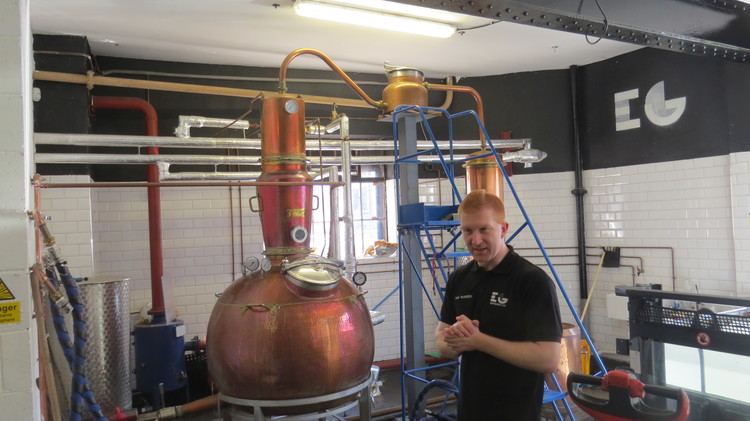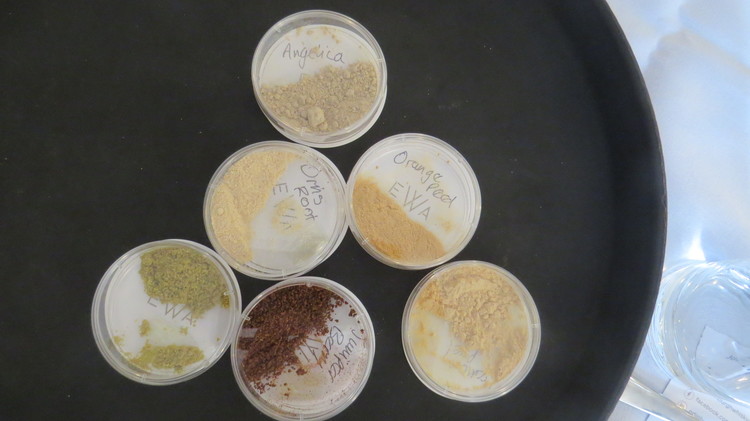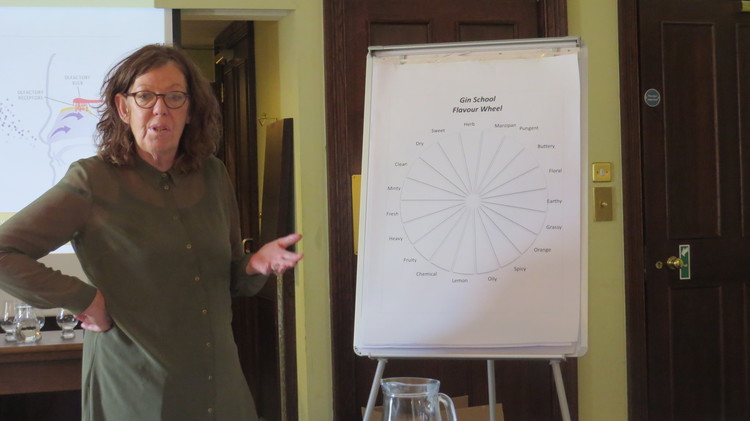 Gin diploma: a visit to Edinburgh Gin distillery and a meeting with Head Distiller, David Wilkinson, are part of the course.
Gin diploma: a visit to Edinburgh Gin distillery and a meeting with Head Distiller, David Wilkinson, are part of the course.
Love gin? Want to know more about it? Edinburgh Whisky Academy have just launched a gin diploma.
We've attended the course and - surprise surprise - double gin lessons are a lot more fun than double algebra.
Given the recent explosion of interest in gin, many people might begin to think they are something of a connoisseur.
In fact, after a couple of different G 'n' Ts, perhaps with a Negroni chaser, this blogger probably isn't the only one who has fancied himself as something of a gin expert.
It is an illusion that, like gin fumes, evaporates by the next morning.
The Edinburgh Whisky Academy gin diploma is built on rather more substantial foundations.
Aimed at brand ambassadors, bar staff, mixologists, spirits retailers and gin enthusiasts this diploma is an in-depth look at the past and present of gin production and consumption.
Gin diploma: SQA accredited
It is good fun and it is very interesting. It is also a proper qualification. The diploma is awarded by the Scottish Qualifications Authority.
It is taught by gin guru, author and owner of the Gintime website, Geraldine Coates.
Over a day, the course looks at the chequered history of gin and places it in its social context as well as examining some of the reasons for the recent renaissance in all things juniper-related.
It covers legal definitions of gin and spells out the differences between London Dry gin, distilled gin and plain old gin.
If you have ever looked at the label of a gin bottle and wondered what maceration means or pondered the origins of grain neutral spirit - the base building block of gin - then this gin diploma will put you straight.
As well as Geraldine's teachings, our class had a visit from Tom Nichol. Tom is the former Master Distiller at Tanqueray Gin and he played a key role in the creation of Tanqueray Ten
He worked for Diageo for 42 years and now acts a consultant for numerous gin makers.
Refreshingly, Tom says it as he sees it. His blunt honesty is very different to the necessarily glowing, advertising type comments of drink brand reps.
Packaging, price and taste
According to Tom, packaging and price are very influential when it comes to selling gin. Satisfyingly for the cynics among us, he says that taste is often one of the last factors to be considered when making a new gin.
However, disappointingly for the cynical, he adds that taste is what keeps customers coming back rather than packaging and price.
Your writer is very keen on Tanqueray and Tanq Ten.
I'm less keen on paying upwards of £30 for a bottle of it considering that it is an un-aged spirit which doesn't require long periods in costly oak casks.
Having heard Tom explain that each Tanqueray Ten distillation only uses the best 60% of the alcohol distilled - the heart of the cut - I'm rather more inclined to part with my hard earned.
Anyway, I digress.
Our diploma teaching also included a visit to the Edinburgh Gin distillery in Leith's Biscuit Factory.
This was a good opportunity to watch head distiller David Wilkinson walk us through the distilling process we had learned about earlier in the day.
It is one thing to read and hear about distilling and quite another to see a distiller in action.
Bag your botanicals
 Gin diploma: the all important botanicals.
Gin diploma: the all important botanicals.
Of course, it is the mix of botanicals, including the all important juniper berries, that give gin its flavour.
And each distiller closely guards the recipe that makes their gin unique. According to Geraldine and Tom there are websites where supposedly top secret gin recipes are sold and traded for large sums of money.
As part of the diploma, our class got hands on with a range of botanicals from orris root to angelica. Apparently, there are some 120,000 possible botanicals and people have used everything from seaweed to ants as flavourings in their gin.
The day after doing the diploma course, there was the option of going to the Secret Herb Garden in the Pentlands and learning more about the botanicals grown there. We'll run that as a separate blog later.
Of course, as part of the diploma, we did a gin tasting. Back in the bad old days, gin tastings were rare as everyone assumed that most gins tasted pretty much the same.
Sampling different gins neat and then with a splash of water - just as you would at a whisky tasting - put paid to that idea.
Gin diploma: classic gin cocktails
One of the most enjoyable aspects of the course was sampling two classic gin drinks and learning about their history.
Everyone has heard of the gin and tonic. In fact, 80% of gin is consumed with tonic water. But not so many people know all about the history of the gin and tonic.
Yes, people know that the quinine in tonic water was used to treat malaria and, during the colonial era, many Brits drank G'n'Ts as a way of warding off the disease.
However, the history goes back much further than that and involves trade wars, clandestine sabotage and all manner of skullduggery between the Brits and the Dutch.
It's an entertaining story. Especially when you have a frosty G'n'T to hand.
Towards the end of the day - but before the cocktails - the class sat an exam covering the history of gin; definitions and styles of gin; gin now, distillation, sensory and cocktails. All the modules in the course.
Assuming that I scored sufficient marks, in a few weeks I will have an SQA accredited diploma in gin.
It might not open many doors for my career. However, the next time that I'm sitting with friends and lecturing them about the differences between different gins, I'll know that I'm doing so with genuine facts rather as a result of gin-fuelled bravado.
The Edinburgh Whisky Academy Diploma in Gin lasts one day and costs £350. The next one is held at The Scotch Malt Whisky Society Vaults in Edinburgh on 30th May.
Update: The next one is now on 19th March 2019.
 Gin guru Geraldine Coates with a gin flavour wheel.
Gin guru Geraldine Coates with a gin flavour wheel.
